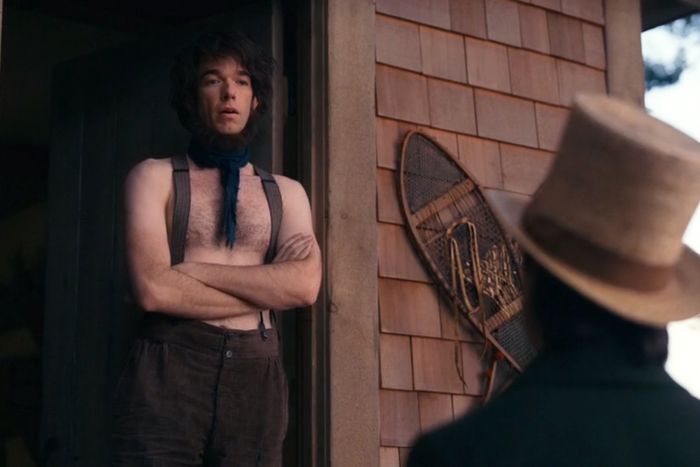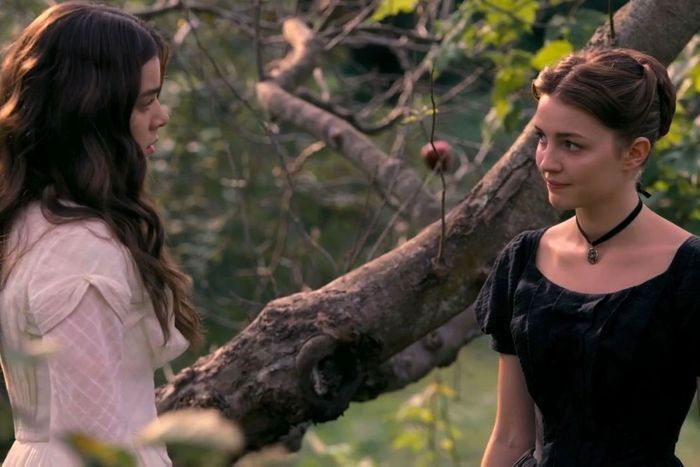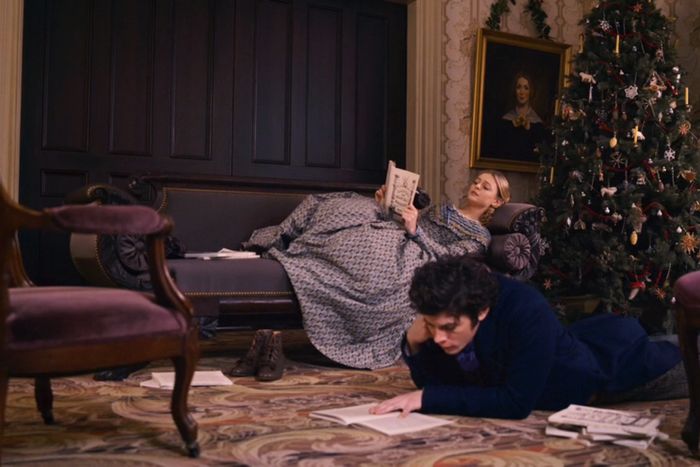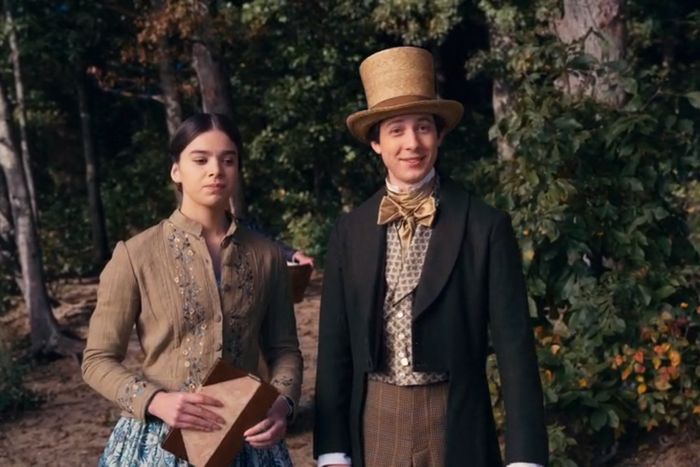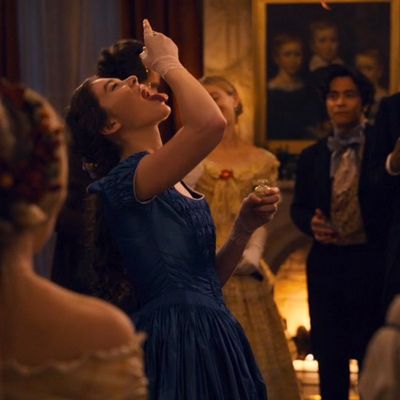
Everyone knows that Emily Dickinson did not do opium, twerk, hallucinate a giant talking bee, take a carriage ride with Death (in the form of Wiz Khalifa), cross-dress and crash a lecture on volcanoes right before having sex with her future sister-in-law, or tell Henry David Thoreau to go fuck himself. But what Dickinson — Alena Smith’s new Apple + series starring Hailee Steinfeld as a wickedly weird, horny, irreverent teen version of the esteemed American poet — presupposes is, maybe she did?
Dickinson is very obviously not meant to be a straight biography of Emily, who, for a long time, was believed to be a reclusive, virginal agoraphobe who died sad and alone in a white nightgown. But the show reconsiders that version of Emily, in part by drawing on more recent scholarship that suggests we’ve been getting Emily wrong for decades. As creator Alena Smith recently told Vulture, “Everyone’s free to invent their own Emily Dickinson, and this is mine. I don’t in any way say it’s the authoritative version.” But Smith did do her research: She says she read “every biography of Dickinson that there is” and consulted with Civil War historians, meaning at least some of the show is based in reality.
Dickinson doesn’t reveal which of its plots are drawn from Emily’s actual life and which are just pure, delightful invention. So I reached out to Martha Nell Smith, a distinguished scholar-teacher, professor of English, and the founding director of the Maryland Institute for Technology in the Humanities, who’s devoted most of her career to studying Emily Dickinson. (While a few scholars have talked about Dickinson’s homoeroticism, Smith is the scholar who has focused most extensively on the idea that Emily and her sister-in-law Susan were romantically involved, publishing a 1998 compilation of their correspondence alongside Ellen Louise Hart called Open Me Carefully: Emily Dickinson’s Letters to Susan Huntington Dickinson.) Smith and I spoke earlier this year about Wild Nights With Emily, another cheeky take on Emily’s life from writer-director Madeleine Olnek, on which Smith consulted heavily. I wanted to know what she thought of the new show, as well as ask her the important questions, like: Did Emily Dickinson’s sister actually get fingered at the dinner table?
What’s your impression of the show?
I’d call it extravagantly and wildly anachronistic. But that’s obviously very conscious. I think Smith wants to blend the past and present. She’s celebrating Dickinson the badass, as it were. It fights against gender constraints and depicts her among people, which I really like. It shows her as a social being, rather than just simply a recluse, which Wild Nights With Emily also does. Both of them put her identity and her work as a writer at the forefront of her story. I do love seeing popular culture waking up to this bold, fierce, strong Dickinson, who’s spunky and funny. As long as nobody thinks they’re getting Dickinson’s biography, I like its playfulness.
When did you first hear about the show?
Around October 2018, my partner and I were going through the Evergreens — Susan and Austin’s house — with some of our very best friends. My partner said, “That’s Jane Krakowski!” And I said, “What in the world would Jane Krakowski be doing here?” And sure enough, it was. We ended up talking to her and Toby [Huss] for three hours. Krakowski really was doing her homework, trying to learn as much about the period as she could.
But you weren’t consulted for the show?
No, but somebody from Apple reached out to me for clearances for Open Me Carefully. It seems to be very clear that Alena Smith knows my work. At the end of the fifth episode, Sue gets a letter from Austin and from Emily. The letter from Emily says, “Open me carefully.” That was inscribed on a letter from Emily to Susan in real life — in that particular letter, Emily is complaining specifically about patriarchy.
I actually know what that real letter said. She says, “Why can’t I be a delegate to the great Whig convention? Don’t I know all about Daniel Webster and the tariffs and the law? Then, Susie, I could see you during a pause in the session. But I don’t like this country at all and I shan’t stay here any longer.”
Between this, Wild Nights, and A Quiet Passion, why do you think there’s suddenly a renewed interest in Emily?
I think that because of very careful scholarship —and I’m talking about my own and other people’s — it’s now accepted that Susan Dickinson was the love of Emily’s life. Very few would now say that’s not true. And many have been unearthing that Dickinson was bold and committed to her art. I think other artists are waking up to that. It’s also very appealing right now, when patriarchy seems to have come back with a vengeance, to look back and see somebody who was in an even more patriarchal world than we live in, and how she thrived.
Let’s talk specifics. In one of the very first scenes, Emily’s mother asks her to get water from the well and she says, “That’s bullshit.” She’s furious that her brother doesn’t have to do it. Did she rail against gender norms in her own family in that way?
I do think she did. She may not have said, “That’s bullshit,” but maybe she did! I don’t know. She did feel, very acutely, the gender constraints. She’ll sometimes make cracks in her correspondence with Austin about him being a man and her being a woman.
Early on, she also convinces her father to hire a maid so that she has more time to write.
I don’t know about that one. Maggie Maher, the maid, wasn’t in the household until 1869. But I give something like this much more leeway. This isn’t Ken Burns. That said, I don’t know that Emily was the reason that they got a maid. I don’t know that she complained. She may have! I do know that she already knew how to bake bread by the time Maggie came on the scene. She won a prize for that.
Her mother, played by Jane Krakowski, is very resentful of her. She says things like, “She’ll be the ruin of this family, she doesn’t know how to behave like a proper young lady.” Is there evidence that she really felt that way?
I don’t know that ever happened, per se, but the Dickinsons all recognized that Emily was different. And was a genius. I don’t think her mother necessarily resented her in that way, but I think that her mother did want to try and teach her about various things. Her mother was very smart, which comes through a bit in the Krakowski character, though I’d like to talk to Jane again and ask her about how she was playing that.
Her father has a very conflicted relationship with Emily’s genius. He says that women who seek literary fame are no better than whores. And she tells his law clerk, Ben Newton, “My father buys me books and begs me not to read them.” Was that their actual dynamic?
“My father buys me books and begs me not to read them” — she did actually say that. I think he both encouraged her reading and writing, and was conflicted about it. Susan was a favorite of his in the family, and one of the things he liked about her was that she was so smart and so well-read.
But he was known to be very overbearing and powerful. There’s a joke about her father — in one photo, he’s staring into the camera and isn’t smiling. The joke is that the photographer said, “Can you smile, Mr. Dickinson?” And he said, “I am smiling.” He was very stern. But at the same time, the Dickinsons were hospitable. They held the Amherst College commencement party every year. They were entertainers, though Susan and Austin eventually took up that mantle.
Would you characterize him as proud of Emily?
I think so. But I don’t think he had any idea how much she was writing. Lavinia may have, and I know Susan was aware of it. He did praise Austin early on for his poetry — Austin’s at Harvard and sends some poems he’s written to his father. Emily says, “Why did you publish poems for our father, but not for me?”
Did she actually publish poetry under Austin’s name? Or any man’s name?
No, that is not accurate. There is some discussion in her letters that makes it clear she was aware of using male pseudonyms, so when Louisa May Alcott tells her, “I can help you by publishing under a male pseudonym,” that was very much in the air.
Did she really meet Louisa May Alcott?
No. Louisa’s father spoke in Amherst in 1878, nearly two decades after this series is set. But I haven’t seen any evidence that she was entertained in the Dickinson houses in the 1850s. She never met Thoreau either.
What did you make of the Henry David Thoreau episode?
There were parts of it that I thought were silly. But that was really great that [Thoreau’s] mother was bringing him food and all that — because that’s true.
Did Emily actually love Walden that much?
I’m not so sure about that. Hold on a minute, let me walk over to a shelf. [Checks notes.] She may have read a biographical sketch of him that was in the Atlantic Monthly — I have it recorded as being in the Atlantic Monthly in August 1862, two months after he dies. She never makes a specific reference to Walden, though she does urge Susan to “Kiss [the Sea] for Thoreau,” seems to have read one of Thomas Higginson’s short sketches about him, and mentions him in a letter to Elizabeth Holland. After Emily died, Ellen E. Dickinson, one of her cousins, says, “Thoreau was naturally one of Emily’s favorite authors from his love of nature and power of description.” So I can see why the series would use that.
What about her strange sense of humor, like when she comes to the dinner table with her hair in front of her face? Is there textual support for that sort of humor coming from her?
She had a wicked sense of humor. I can’t imagine her ever doing quite that — it seems to me to be an example of Alena Smith blending the past with the present. In one of the later episodes, Emily says to Susan, “It’s metaphor.” And I thought, “Is that a message from the creators to the viewers?”
What about her obsession with death?
If I walk into a room and I say, “Tell me what you know about Emily Dickinson,” someone will say, “She was morbid and she had an obsession with death.” That’s something that’s gotten attached to her. She was surrounded by death. These days, we’re occasionally with our family members when they die. But in the 19th century, that happened a lot. They’d often be in the presence of somebody dying. She was definitely conscious of death in ways that we’re not, but whether she was obsessed with it or in love with that, I’m not sure.
Let’s talk about her relationship with Sue. I know this is your particular area of expertise. What’d you think about how it’s represented here?
One of the things I like about both Wild Nights With Emily and Dickinson is that the relationship with Susan is really at the center of Dickinson’s love life. Later, Ben Newton is introduced as a law clerk of her father’s. That’s accurate. Some people think they had some kind of romantic relationship, but most people don’t think that’s true at all, and I agree that there’s not really evidence to support that. And Emily says to Susan, “I love Ben almost as much as I love you.” She still puts her love for Sue above that. That rang very true to me.
I also like how, in Wild Nights, Sue says, “You’re the one who writes the poems! ‘Sue — forevermore!’ ” In other words, she’s worried they’ll be found out. In one of the very last scenes of Dickinson, when Sue gets the same little poem that reads, “One sister I have in our house, and one a hedge away” — that particular poem really puts Susan at the center of her imaginative life. “I spilled the dew but took the morn, I chose the single star … Sue — forevermore!” Besides naming her beloved Sue, she’s linking Sue to the order of the cosmos. Sue is the star who’s chosen from many.
What about their sexual relationship? Is there evidence that they were sexually involved as well as romantically?
Both Wild Nights and Dickinson depict them as having a sexual relationship, and I’m fine with that. One of the things that separates Emily’s effusive outpouring of love for Susan from what we see in romantic friendships of the 19th century between women is that Emily is very self-conscious. [Quotes a letter from Emily to Susan:] “Susie, forgive me, forget all what I say, get some sweet little scholar to read a gentle hymn, about Bethleem and Mary, and you will sleep on sweetly and have as peaceful dreams, as if I had never written you all these ugly things,” speaking to her affection and how expressive she’s been. Can I prove that they actually had sex? I don’t know! But it doesn’t bother me that Wild Nights and Dickinson both assert that they did.
What about when Emily says she wrote Sue a letter expressing that she was “chained up in an insane asylum of love”?
She does have a letter where she does talk about being chained up. “Oh Susie, I often think that I will try to tell you how very dear you are, and how I’m watching for you, but the words won’t come, though the tears will, and I sit down disappointed. Yet, darling, you know it all — then why do I seek to tell you? I do not know. In thinking of those I love, my reason is all gone from me, and I do fear sometimes that I must make a hospital for the hopelessly insane, and chain myself up there so I won’t injure you.”
She’s so passionately in love with Susan. A long time ago, when I first started studying them, that was one of the first things that made me realize this is out of whack with what you usually see in a romantic friendships, this idea of feeling that other people would disapprove. That suggests, to me, erotic attachment. She also wrote, “We are the only poets, and everyone else is prose.” She sent more poems, letters, and letter-poems to Susan than to any other correspondent. That speaks volumes.
If they had been caught by Austin or her family had found out, how might society have reacted?
It would have been as if they didn’t see what they were seeing. Everyone thought, “They’re sisters, they’re very close.” That’s how their relationship was received by others. But when Dickinson died — and this is very clearly depicted in Wild Nights — there was no dispute about who would wash her body. It was Sue. It’s a very intimate thing. I think people had a sense of how completely devoted to one another they were. Whether they suspected that there was actually an erotic, sexual component, that could be one of those things that people refuse to know.
The whole thing in the last episode where Austin is so jealous and tells her she can’t come to the wedding — which was in Geneva, New York, not Amherst — Emily really didn’t come. None of the Dickinson family went.
Why?
That’s a good question. They didn’t go. Susan’s aunt hosted it. People said the Dickinsons didn’t travel that much, but Edward had to go to Washington to serve in Congress and did have business in Boston.
What do you make of the episode where Emily says she’s “taking dictation from God”?
The way I read that, this is a woman who is confident of her poetic abilities. And is completely dedicated to her art. And she sees her calling as a poet as a holy calling.
Even though she really didn’t believe in God?
Yes, even though she was an agnostic. That whole thing of a poet believing themselves to have a particular calling — that permeates Western literature, Western culture, and beyond.
Despite the conflict over Sue, she and Austin are depicted as good friends. Is that accurate?
She and Austin were very close growing up, but as they got older — it’s not that they became antagonists, but they just grew apart. In Wild Nights, she did absolutely refuse to meet Mabel Loomis Todd, his mistress. She adored him growing up and continued to adore him, but he later became very preoccupied with his profession and other things. And, of course, she’s in love with Susan.
What did you think of the portrayal of Lavinia as a loopy, horny, but politically engaged woman?
I think Lavinia is hilarious in this show. I do have to say that I absolutely love Jackie Monahan’s portrayal of her in [Wild Nights], where she’s kind of dotty but also very smart. The Lavinia in Dickinson is younger and does capture what I know about her. She was very flirtatious.
Is there any evidence that Emily had parties and took opium?
The opium party, I was like, “Hmmm. Why is this here?” Opium was used as a painkiller and all of that. Whether George Gould brought some to Emily to take at a party? I don’t know. Maybe Smith is trying to capture that Dickinson was much more social than we’ve been led to believe, and that she was fun-loving. I think that’s true. But opium? I don’t know.
Lavinia gets fingered at the dinner table, and Austin and Sue have premarital sex. Was there sex before marriage in that sort of society during that time?
It is true that 19th-century couples had more sex and had sex before marriage than we may think they did. That did happen. The whole thing at the dinner table? I don’t think so. I think it’s hilarious, but that’s an example of playing somewhat fast and loose. [Laughs.]
Was there any evidence that Emily and George were romantically involved?
They were friends. He was a very good friend of her brother’s, an Amherst college classmate. That’s really his connection to the Dickinsons, as far as I know. A 2008 article does assert that a memoir of Ann Eliza Houghton Penniman states that George and Emily were engaged while he was at Amherst College, but that her father vetoed the whole affair because Gould was poor. I seriously doubt they were engaged for a number of reasons. Some people have proposed that he was the addressee of the Master Letters, but I associate the George Gould stuff with very early biographers who identified him as a suitor. One of the early biographers speculates that they may have been briefly engaged, so that’s not coming from nowhere.
But you don’t believe that?
I think the Master Letters were epistolary exercise, fiction. She was surrounded by that kind of fiction.
What about the idea that she was bullied by the “cool girls” in Amherst?
There’s evidence that one of her contemporaries thought she was kind of weird. Maybe Jane Humphrey. That has some basis in somebody’s record. But she was also very social and people liked her.
Was Sue pregnant when she and Austin got married?
Well, there’s an unreliable source that suggests that she has had multiple abortions. Mabel Loomis Todd, in her journal — and I consider this not a reliable source — that she had caused “three or four to be artificially removed and had failed in repeated attempts to prevent Ned’s birth.” But that’s according to Mabel.
What about the dead baby that Austin digs up in the graveyard?
[Laughs.] That was weird! Austin and Susan are buried in Wildwood Cemetery, a little outside of Amherst. They’re not buried where Edward and Emily Senior and Lavinia are buried.
Might Emily have had a Shakespeare Club?
That rings true to me. In one of her writings to Susan, she writes, “With the exception of Shakespeare, you’ve told me of more knowledge than anyone living.” And one of the very last things Emily writes to Susan is, “Do you remember what whispered to Horatio?” She’s referring to Horatio in Hamlet; the dying Hamlet basically says to Horatio, “If you ever loved me, then please postpone the sweet relief of death awhile, and stay in this harsh world long enough to tell my story.” She basically employed Susan to go tell her story. This story is being told, it’s being retold, and it needs to be told again and again.
Is it surreal to see your work influencing popular culture like this?
I am really happy to see the bold, funny, assertive Dickinson being recognized, because she was all of those things. I’m also so happy to see it recognized that the love of her life was Susan Dickinson. That’s really important. It brings to the surface and celebrates a powerful love story. If you read Dickinson’s letters, you’ve got to see that it’s there. And that it’s there in the poetry. “Sue — forevermore!”



